The 15th congress will be held from May 2 to May 6 at COEX in Seoul
“The World Forestry Congress (WFC) will be held for the first time in Korea and the third time in Asia. Under the theme of ‘Building a Green, Healthy and Resilient Future with Forests,’ the Congress will focus on the role of forests as a means of responding to climate change,” said Minister Choi Byeong-am of the Korea Forest Service (KFS).
In an interview with the Korea Post, Choi said, “The World Forestry Congress is the largest and most significant gathering of members of the world's forestry sector, and it is held every six years.
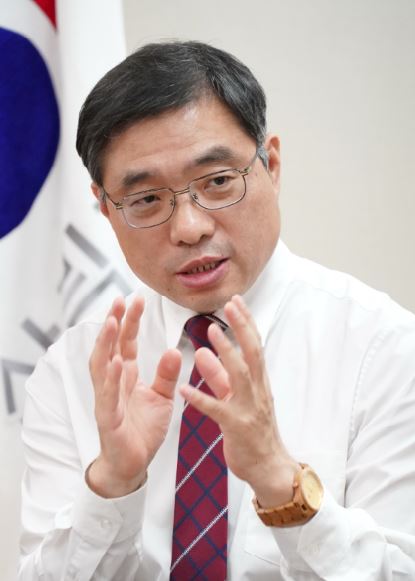
“The Congress is a forum for exchanging views and experiences on all aspects of forestry and the environment, including climate change, biodiversity, and other issues. The Congress can help identify actions to solve pending issues.”
The following is an excerpt from an interview with Choi Byeong-am, Minister of the KFS.
Question: Surprisingly, the Congress will be held for the first time in the Republic of Korea, as it is the only nation to be successful in reforestation since World War II. Speaking of which, could you walk us through how the Republic of Korea has accomplished forest restoration?
Answer: In the 1970s, our country accomplished reforestation through people's voluntary efforts and the government's policy support.
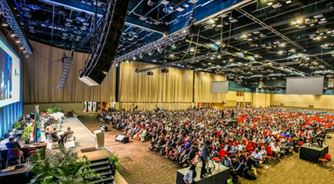
The destruction of forests brought about avalanches, floods, and other disasters, and reforestation began when people started to notice the importance of our forests. The government also supported this movement through various policies. For instance, by implementing the tree management system, it started to analyze the survival rate of trees in many regions.
Illegal logging was prohibited, and the public officers with the highest planting rates were promoted or received incentives from the government. The Korean government began to make a better environment for tree growth by introducing eco-friendly policies.
Q: At this point, I also wonder why South Korea is the only country that has made reforestation happen. Why is the recovery of deteriorated forests so difficult and demanding?
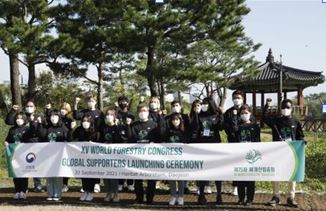
A: Reforestation can never be accomplished by just planting many trees. We must also take care of them until they are fully grown. Reforestation in Korea was successful because we implemented various policies to protect our forests.
Before 1970, trees were our country's main natural resources. To endure harsh winters, we had to cut them down and use the wood for fire. However, beginning in 1970, the government started to develop coal mines to provide coal to households. As a result, we have successfully minimized the use of firewood and prevented the cutting down of trees in the mountains.
Also, to prevent slash-and-burn agriculture, the government provided new settlements and jobs to the farmers. Through this national effort and policy support, the Korean government was able to prevent deforestation.
Likewise, reforestation does not only involve planting many trees. The trees must be backed up with long-term support until they are fully grown, which is why reforestation is very difficult.
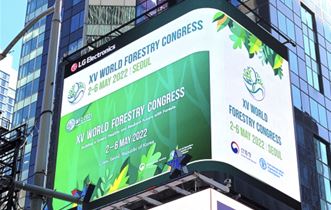
Q: The Republic of Korea is the leading nation for forests, and I think the world may pay attention to its know-how and tips on the methods and policies it utilized for forest restoration. Has the Republic of Korea shared its knowledge of turning bare land into a green nation with other countries?
A: Korea's successful forest restoration story is recognized worldwide. As a result, many researchers and policymakers want to visit Korea to see the site and request the reforestation technique.
In the earlier stage, the Korea Forest Service shared some forest restoration know-how with Mongolia and China, which are geologically close, to help prevent deforestation.
The Korea Forest Service is currently handing down forest restoration techniques to Indonesia, Vietnam, Myanmar, and other South-East Asian countries, as well as countries in Central Asia, South America, and Africa.
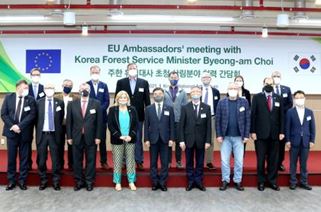
In the future, Korea Forest Service plans to distribute its superior forest management policy worldwide and will be a leading country in advanced world forestry issues.
Q: There are about OO days until the opening of the World Forestry Congress. How is the preparation going?
A: To be honest, there were a lot of difficulties preparing the XV World Forestry Congress due to the COVID-19 pandemic. Securing participants is the most important factor and will determine the success of the Congress; it was very challenging.
The Secretariat has used its best efforts to establish a thorough quarantine system, which ultimately allows everyone to participate in the Congress with ease of mind. To prevent foreign entrants from becoming infected with COVID-19, Korea Forest Service has consulted with the relevant authorities and prepared a case-by-case quarantine manual. The agency plans to respond quickly to all emergencies.
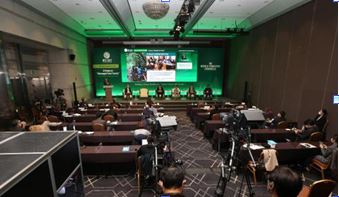
As the host country, the Republic of Korea will ensure that the 15th World Forestry Congress is held in a venue with little risk of infection. Robust preventive measures will be in place, allowing for in-person meetings and interactions among the participants. We are very much looking forward to seeing you in person at the Congress, which will be bustling with life, energy, and lively exchanges.
The Secretariat is currently employing many ways of securing participants from forestry stakeholders around the world. Also, in Korea, the Secretariat has secured over 6,600 registrants after holding informational campaigns that targeted forestry-related institutions, groups, and local governments.
The Secretariat is currently preparing programs for undergraduate and graduate students. The World Citizens Program also targets middle school students, the future generation.
The Secretariat has a financial support program for participating developing countries. The Secretariat also promotes foreign students residing in the Republic of Korea. Thus, despite the difficult situation, the Secretariat prepares.

Q: Since COVID-19, several international meetings have become hybrid or mixed on-site and virtual events. What is the modality of the XV World Forestry Congress (WFC)?
A: Since it is difficult for foreign participants to enter the country, the upcoming 15th WFC will be a mixed online and offline event like other international conferences. However, since a large number of domestic participants has been secured, we plan to proceed in a field-oriented hybrid form.
Q: Could you tell us who is planning to participate in the Congress?
A: Overseas, United Nations Secretary-General António Guterres and the other heads of various international organizations, including the Food and Agriculture Organization of the United Nations (FAO), Global Environment Facility (GEF), and International Renewable Energy Agency (IRENA), will play a major role and participate in the Congress in various forms.
On the government side, forest and related ministries from more than 40 countries, including the prime minister of Barbados, will attend.
All forest field stakeholders, such as government officials, international and civil society organizations, academia, and businesses, will attend this global gathering to review and discuss policies on forests and the environment.
Representatives of lumber companies, IKEA, indigenous and youth communities, are among those of the private sector and civil society organizations whose voices can also be heard at the event.
Q: The 15th WFC's theme is 'Building a Green, Healthy, and Resilient Future with Forests.' Is there any context or reason for choosing this theme?
A: The 15th WFC selected the theme containing these purposes and meanings to call on the world's forestry community to make efforts to achieve the 2030 Sustainable Development Goals (SDGs) and play an important role to find ways to overcome COVID-19.
Accordingly, the 15th WFC will be an ideal platform for the global forest community to gather, exchange experiences and ideas about all aspects of forests, and devise recommendations applicable at national, regional, and global levels.
Also, to recognize the importance of forests in promoting the health of the Earth and humankind in the sense that forests can be considered as essential elements in discussions and decisions to make the future sustainable, we selected the agenda as 'Building a Green, Healthy, and Resilient Future with Forests.
Q: Lastly, please tell us why the forest is so important to people and what we can do to protect it.
A: According to forest value data analyzed by the Korea Forest Service, the public value of forests amounts to about 221 trillion won per year. In other words, each citizen receives an annual benefit of 4.28 million won.
Forests absorb and store carbon dioxide while releasing oxygen into the air. They also beautify landscapes and help prevent natural disasters like landslides and floods. Recently, many people have been relaxing in forests, allowing their minds and bodies to rest.
Forests are so precious, and I hope everyone is interested in actively protecting them. It is said that fires resulting from individuals' carelessness are among the major causes of wildfires annually. Please remember not to carry anything that could start a fire, like a lighter or a match, and do not illegally clear forest lands or engage in illegal logging.
Lastly, I look forward to your participation in the XV World Forestry Congress, which will be held in Korea from May 2 to May 6 and seek solutions to global forest problems.

